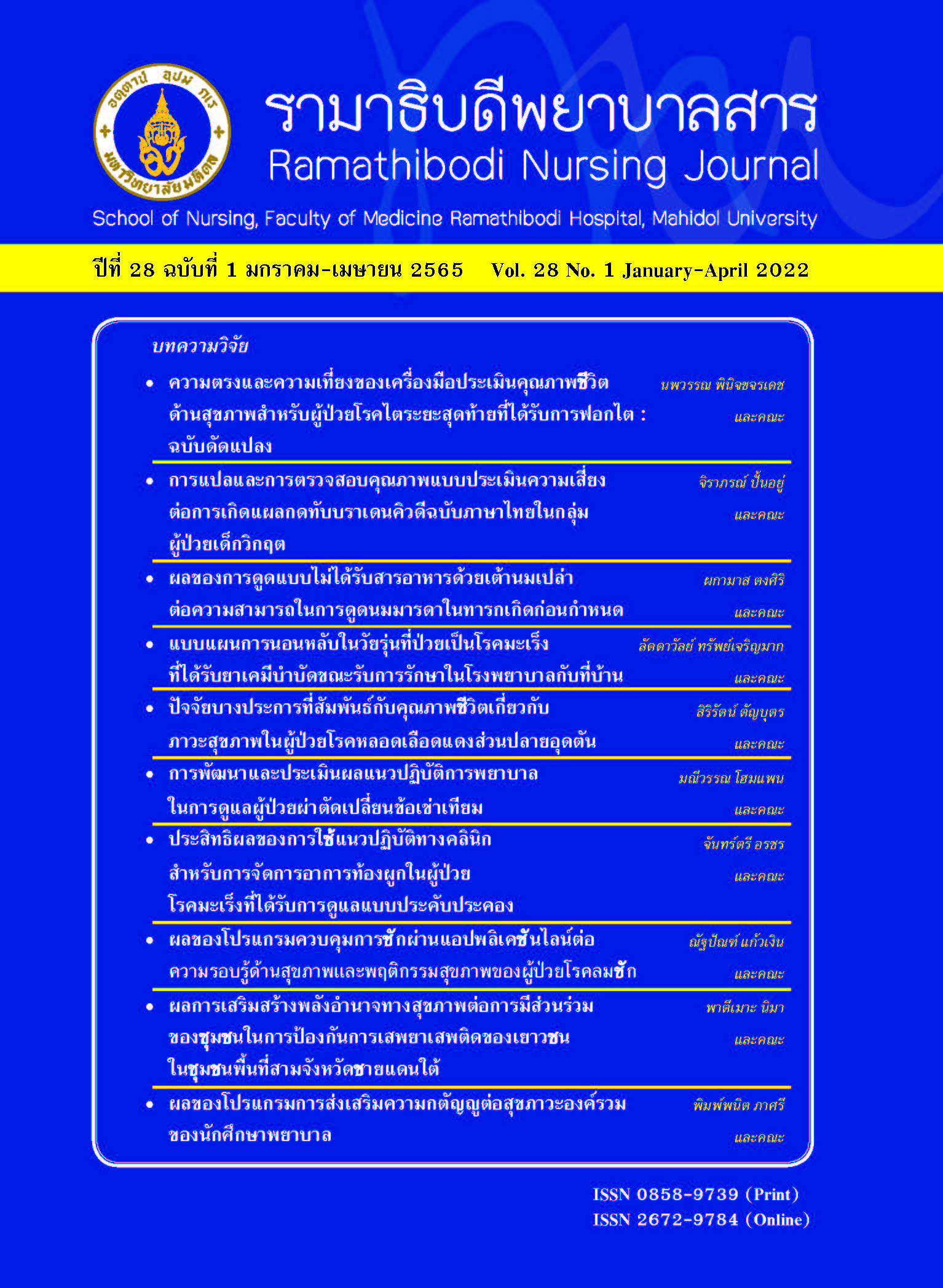Effect of Health Empowerment on Community Participation for Youth Substance Abuse Prevention in Communities in Three Southern Border Provinces
Main Article Content
Abstract
The participatory action research (PAR) aimed to explore the level of community participation, compare community participation in youth substance abuse prevention, and study the model for substance abuse prevention among youths in communities in three southern border provinces. The participants for the quantitative study were selected by random cluster sampling in each province: Yala, Pattani, and Narathiwat. They consisted of 342 participants,including community leaders, religious leaders, women leaders, youth leaders, public health volunteers, and religious scholars. Then 75 of 324 participants were selected for the qualitative research study. The research had been conducted for nine months. The data collection instruments included the Personal Information Questionnaire, the Community Participation in Prevention and Solution of Drug Problem Questionnaires and a semi-structured interview
guide for focus group discussions. Descriptive and paired t-test statistics were used to analyze quantitative data, and content analysis was used to analyze qualitative data. The results revealed that the overall of community participation of youth substance abuse prevention in communities in three southern border provinces was at a moderate level. The mean overall and subscales of
community participation scores after implementation of health empowerment were significantly higher than before implementation health empowerment. The model for success of youth substance abuse prevention in communities in three southern border provinces consisted of three models: the brother helping brother model, the community leaders as a leadership model, and the community committee model for youth substance abuse prevention in communities.Thus, healthcare providers and related personnel should use the concepts of health empowerment and community participation in preventing substance abuse among youths in communities.
Keywords: Health empowerment, Community participation, Youth substance abuse
prevention
Article Details

This work is licensed under a Creative Commons Attribution-NonCommercial-NoDerivatives 4.0 International License.
บทความ ข้อมูล เนื้อหา รูปภาพ ฯลฯ ที่ได้รับการตีพิมพ์ในรามาธิบดีพยาบาลสาร ถือเป็นลิขสิทธิ์ของวารสาร หากบุคคลหรือหน่วยงานใดต้องการนำทั้งหมดหรือส่วนหนึ่งส่วนใดไปเผยแพร่หรือเพื่อกระทำการใด ใด จะต้องได้รับอนุญาตเป็นลายลักษณ์อักษรจากรามาธิบดีพยาบาลสารก่อนเท่านั้น
References
United Nations Office Crime on Drug. World Drug Report 2017. New York: United Nation; 2017.
Information and Investigative News for Civil Rights Center.Update the drug situation in the world and Thailand; 2018
[cited 2019 December 30]. Available from: https://www.tcijthai.com/news/ 2018/4/scoop/7878.
Jaikla K, Phuengchuea K, Paileakly S. Health risk behaviors for substance abuse behavior and social networks
of youth in non-education system research report. Thailand Substance Abuse Academic Network (TSAAN); 2016.
Northern Substance Abuse Center. Summary of the lesson in the process of following home visit of substance abusers/
risk groups and families of Prachasakha 9 provinces Kao Phiwat community Lower North. Chiang Mai University;2016.
Sangsana C, Thaiaree P. People Participation in the Prevention and Solution of Drug Problems in the Community: A Case Study of Baan Klong Muang Nuea,Village No. 3, Lapaya Klang Sub-district, Muang District,Chiang Mai Province. Muaklek, Saraburi Province [thesis].Bangkok: Dhurakij Pundit University; 2015. (in Thai).
Phukaew A. Public participation in solving drug problems in the Antimony Sub-district Municipality, Khao
Khitchakut District Chanthaburi Province [thesis]. College of Public Administration, Burapha University; 2013. (inThai).
Wongsamut N. Drugs: One of the threat of people in deep south. BBC Thai; 2017 [cited 2019 January15].Available from: http://www.bbc.com/thai/thailand-40075113
Gibson CH. A concept analysis of empowerment. J AdvNurs. 1991;16:354-61.
Suwanimit A. Primary care nursing and community empowerment. Mahasarakham: Apichat Publishing;2010.
Albrecht SL, Andreetta M. The influence of empowering leadership, empowerment and engagement of affective
commitment and turnover intentions in community health service workers. Leadersh Health Serv. 2011;24:228-37.
Randolph WA, Kemery ER. Managerial use of power bases in a model of managerial empowerment practices and
employee psychological empowerment. J Leadersh OrganStud. 2011;18:95-101.
Elloy D. Effects of ability utilization, job influence and organization commitment on employee empowerment: an empirical study. Int J Manag. 2012;627-33.
Pinkaew P. Empowerment and organizational commitment between Japan and Thai organization. Strategic management
faculty of commerce and accountancy [thesis]. Thammasat University; 2015. (in Thai).
Photiwan P. Community potential to prevention and solutions drug problems [thesis]. Rajabhat Mahasarakham
University; 2014. (in Thai)
Gibson CH. The process of empowerment in mothers of chronically ill children. J Adv Nurs. 1995;21:1201-10.
Ngamjarus C, Chongsuvivatwong V. n4Studies: sample size and power calculations for iOS. The Royal Golden
Jubilee Ph.D. Program-The Thailand Research Fund &Prince of Songkla University; 2014.
Amporn P. Participation of public in solving drug problems in Pluang sub-district municipality, Khaokitchakut district,Chanthaburi province [thesis]. Burapha University; 2013.(in Thai).
Bunim D. The participation of community leaders on measures to solve drug problems in the community of Bang Mae Nang Sub-district, Bang Yai District, Nonthaburi Province. Research report; 2013.
The Southern Border Incident Database Working Group.Situation of violent conflict in the southern border; 2017.
[cited 2020 April 6]. Available from: http://www.deepsouthwatch.org/sites/default/files/dsid_ update_2017_q1_final.pdf
Srimueangkanchana C. Drugs: complications in the Southern border provinces; 2017 [cited 2019 February12]. Available from: http://www.parliament.go.th/library
National News Bureau of Thailand. Drugs was dangers and complications in the southern border provinces; 2017.
Available from: http://region6.prd.go.th/ewt_news.php?nid=10836&filename=index
Suwanimit A. Primary care nursing and community empowerment. Mahasarakham: Apichat Publishing;2010.
Office of Narcotics Control Board Region 9. Drug Situation in the Lower Southern Region, October 2016–March;2017 [cited 2019 November 22]. Available from:https://www.oncb.go.th/
Nima P. Effects of promoting community roles in adopting drug addiction treatment model appropriate to local cultural
context: a case study of Ban Bang Pla Mor community.Research report. Pattani: Pattani Drug Dependence
Treatment Center; 2007.


